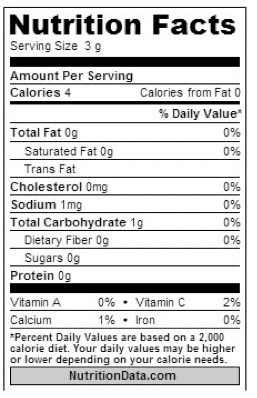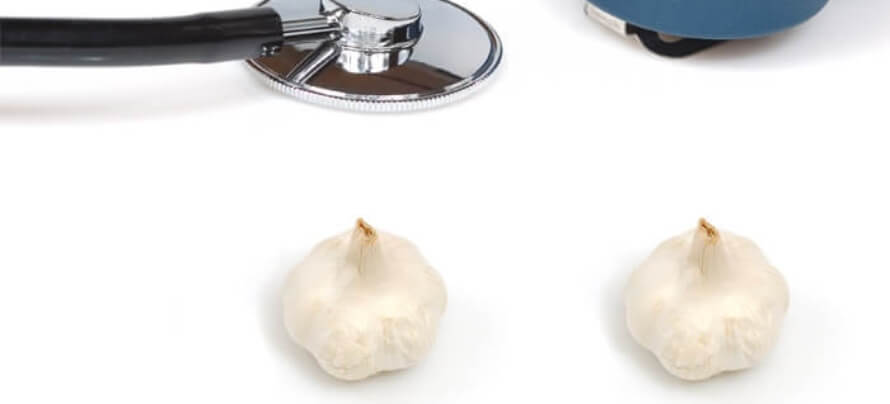Key Takeaways
- Garlic contains bioactive compounds that produce a pungent flavor, but also health benefits.
- Consuming garlic can boost your immune system, reduce your cholesterol and blood pressure, and help reduce your risk of cancer.
- Eating a lot of garlic can cause bad breath and body odor, but consuming it with milk or other food helps reduce these effects.
Garlic has been used for millennia as both food and traditional medicine.
Most people enjoy the flavor as a kick in their cooking, but is its use as medicine justified?
Naysayers claim that it’s nothing more than a pungent plant used in food.
Others describe it as a panacea of health—a superfood that can even cure cancer.
Who’s right?
In this article you’re going to learn about the health benefits of garlic, where these properties come from, what causes garlic breath, and more.
- Garlic Contains Bioactive Compounds
- Garlic’s Nutritional Profile
- Garlic Boosts the Immune System
- Garlic Improves Cholesterol Levels
- Garlic Reduces Blood Pressure
- Garlic Reduces the Risk of Dementia
- Garlic Helps Reduce the Risk of Cancer
- What Are the Downsides of Garlic?
- Garlic Effects Blood Clotting
- Garlic Breath and Body Odor
- The Bottom Line on Garlic
Table of Contents
Garlic Contains Bioactive Compounds
Garlic is a plant in the onion family that’s often used as a food flavoring. It’s known for its pungent, spicy flavor, but it’s also been used for centuries in traditional medicine and as a supplement.
Garlic’s strong taste and smell comes from being particularly rich in sulfur compounds, some of which are created from chemical reactions when fresh garlic is chopped, crushed, or chewed.
These sulfur compounds, which include allicin, diallyl disulfide, and s-allyl cysteine, also play a role in garlic’s health benefits.
Summary: Garlic contains sulfur compounds which have biological effects and are responsible for many of its health benefits.


Garlic’s Nutritional Profile
Many people praise garlic for its rich micronutrient profile.
Although this is true—garlic is high in nutrients—you’d need to eat a lot of cloves to get close to your RDI of most nutrients. Considering most people don’t eat more than a couple cloves a day at most, garlic generally doesn’t contribute much to people’s overall nutrient intake.
So, even though it’s nutrient dense, don’t expect a few chunks to make a significant dent in your daily micronutrient goals.
Here’s the nutritional profile of one garlic clove, from NutritionData.com.

As you can see, a clove of garlic is very low in calories, fat, cholesterol, and sodium, but also contains:
- 3% of your recommended daily value (RDV) of manganese
- 2% of vitamin C and vitamin B6
- 1% of both calcium and selenium.
That’s not too bad considering the calories, but in practice, garlic isn’t going to be your primary source of vitamins and minerals.
Summary: Garlic is rich in manganese and vitamin C, but you don’t eat very much garlic at one time, so it’s not going to be a major source of micronutrients in your diet.
Garlic Boosts the Immune System
Nobody likes getting sick.
You feel like crap and have to take time off from your training.
Well, one of garlic’s most interesting health benefits is it may help boost your immune system.
In a 12-week study conducted by scientists at the Garlic Center in East Sussex, scientists found that daily supplementation of allicin reduced the number of colds (and their duration) in a group of 146 volunteers.
In another study conducted by scientists at the University of Florida, the researchers found supplementing 2.5 grams of aged garlic extract per day can increase the number of natural killer immune cells in the body. The supplementation group also experienced less cold and flu symptoms and fewer sick days.
On the other hand, two different scientific reviews have concluded the evidence in support of using garlic for the treatment of colds is insufficient.
Summary: Several scientific studies show garlic may enhance immune cell function and reduce how many colds you get.
Garlic Improves Cholesterol Levels
Cholesterol is a pale, waxy compound called a sterol, which is a kind of modified steroid that’s chemically similar to fat. It’s present in all cells of the body, and it’s used to make hormones, vitamin D, and chemicals that help you digest your food.
When people refer to “cholesterol,” what they’re usually talking about are lipoproteins, which are proteins made of cholesterol and triglycerides.
Triglycerides are a kind of fat in your body that help you absorb vitamins, create various hormones, keep your skin and hair healthy, provide energy for cells, and much more.
Lipoproteins act like taxis, ferrying fat and cholesterol to and from cells.
These molecules stick to the walls of your blood vessels, and over time, form plaques and begin to block blood flow.
If a piece of plaque breaks loose, travels through the bloodstream and gets stuck, it can cause a heart attack or stroke.
So, it’s no surprise that high cholesterol (LDL cholesterol in particular) is associated with an increased risk of heart disease, which is the leading cause of death internationally.
Some of the best ways to lower your cholesterol are to exercise, quit smoking, lose weight, and eat a healthier diet.
There’s also solid evidence garlic can help improve cholesterol levels.
In a meta-analysis conducted by scientists at the University of Adelaide, the researchers found garlic reduced total cholesterol and LDL cholesterol in people with elevated levels.
Other reviews conducted by scientists at the University of Exeter, University of Oxford, and Pennsylvania State University found the same thing.
Garlic can also improve heart health by slowing down the hardening of arteries, a process known as atherosclerosis.
In a four year study conducted by scientists at Humbolt University, the researchers found high-dose garlic powder reduced the creation of arteriosclerotic plaque in arteries or and in some cases even decreased plaque deposits that were already there before the study.
Even though garlic doesn’t lower triglycerides, it can still improve your heart health and reduce your risk of heart attack by lowering your LDL cholesterol levels, which helps prevent the build up of plaque in your arteries.
Summary: Garlic can reduce total cholesterol and LDL cholesterol, and slows down the accumulation of plaque in the arteries.
Garlic Reduces Blood Pressure

Another way garlic can improve heart health is through its effects on blood pressure.
High blood pressure is one of the biggest contributors to cardiovascular disease.
In a study conducted by scientists at King Khalid University on patients with hypertension, scientists found that supplementing garlic between 600 mg and 1,500 mg for 24 weeks has comparable effects to Atenolol, a medication prescribed for high blood pressure.
Other studies at the Postgraduate Institute of Medical Education and Research, the University of Adelaide, and the University of Basel have also shown that garlic supplements can reduce blood pressure, even if weakly.
Summary: Garlic can reduce blood pressure in individuals with hypertension.
Garlic Reduces the Risk of Dementia
Dementia is a relatively common condition that generally develops in older people. It’s characterized by a decline in mental abilities, including memory loss and impaired judgment.
Oxidative damage (the damage of cells due to oxygen reacting with free radicals) is a major factor in the development of dementia, as well as other chronic conditions.
In fact, excessive free radicals have been associated with aging, cardiovascular disease, cancer, and neurodegenerative disorders.
Antioxidants help prevent cellular damage by keeping free radicals under control.
And it just so happens garlic contains antioxidants that can protect against oxidative damage.
Considering that risk factors for heart disease like high cholesterol, hypertension, and inflammation also increase the risk of dementia, and garlic can fight these conditions as well, you may be wondering if garlic can reduce the risk of dementia.
Well, that’s exactly what research shows.
Summary: Garlic contains antioxidants, which help protect against oxidative damage, which is a major factor in the development of many diseases including dementia.
Garlic Helps Reduce the Risk of Cancer
The National Cancer Institute recommends garlic as an anti-cancer food.
Additionally, many studies show garlic can protect against various cancers:
- Eating a lot of raw or cooked garlic is associated with a protective effect against stomach and colorectal cancers.
- Increased garlic consumption may reduce pancreatic cancer risk.
- Increased raw garlic intake may protect against lung cancer.
- Eating more garlic is associated with a decreased risk of prostate cancer. This was confirmed by meta-analysis.
- Eating more allium veggies (including garlic) is associated with less upper digestive tract cancer.
Ultimately, garlic is an excellent food for the prevention of many types of cancer.
Summary: While not a cure, garlic has lots of supporting evidence as a cancer-fighting food.
What Are the Downsides of Garlic?
So far, we’ve covered the health benefits of garlic.
But what are the disadvantages? Does garlic have any negatives associated with it?
Garlic Effects Blood Clotting
Garlic modifies platelet aggregation (blood clotting). That means it “thins” the blood, slowing down clotting.
If you’re taking a blood thinning medication, it would be a good idea to check with your doctor before increasing your garlic intake or supplementing with it.
Garlic Breath and Body Odor
Most people have experienced eating a garlic-heavy meal and noticing their breath stinks afterwards, or they’ve started “sweating garlic” for hours afterward.
Breath mints and taking a shower don’t help much because they don’t address the underlying issue.
These odors are caused by allyl methyl sulfide (AMS), one of the sulfur compounds in garlic. AMS gets absorbed in the blood, where it travels to the lungs, mouth, and skin. AMS isn’t broken down very effectively, so it can last for hours, excreted through our sweat and breath.
Is there any way to prevent this?
Research shows consuming milk with garlic can help neutralize garlic breath. Specifically, mixing milk and garlic before swallowing works better than drinking milk afterwards.
Or, if you don’t want to corrupt the pleasant, mild taste of milk with pungent garlic, drink some milk, eat some garlic, then finish drinking your milk.
Plain water can help too, along with mushrooms, parsley, celery, and basil, but the mix of fat and water found in milk works best.
Summary: Consuming garlic can reduce blood clotting and cause bad breath and body odor, but drinking milk with garlic can help reduce its bad breath and body odor effects.
The Bottom Line on Garlic
Garlic contains sulfur compounds, which have biological effects and are responsible for many of its health benefits.
Though garlic is rich in manganese and vitamin C, you don’t eat very much garlic at one time, so it’s not going to be a major source of micronutrients in your diet.
As far as major health benefits go . . .
- Garlic supplements have been shown to enhance immune cell function and reduce how many colds you get.
- Garlic reduces total cholesterol and LDL cholesterol, and slows the accumulation of plaque in the arteries. This lowers your risk of heart disease and heart attacks.
- It can reduce blood pressure in individuals with hypertension, which also reduces your risk of heart disease.
- Garlic contains antioxidants, which help protect against oxidative damage, which plays a major role in the development of many diseases including dementia.
- Garlic helps reduce the risk of various types of cancer.
The only downsides of consuming garlic are that it can reduce blood clotting and cause bad breath and body odor.
If you can deal with these minor side effects, though, garlic is a very healthy food worth including in your diet not only for its taste, but for its health benefits.
What’s your take on the health benefits of garlic? Have anything else you’d like to share? Let me know in the comments below!
+ Scientific References
- A, H., & SA, B. (2010). Effect of milk on the deodorization of malodorous breath after garlic ingestion. Journal of Food Science, 75(6). https://doi.org/10.1111/J.1750-3841.2010.01715.X
- F, B., R, C., & AA, I. (2007). Garlic (Allium sativum L.): adverse effects and drug interactions in humans. Molecular Nutrition & Food Research, 51(11), 1386–1397. https://doi.org/10.1002/MNFR.200700072
- V, G., F, T., C, L. V., C, G., & A, T. (2016). Allium vegetables and upper aerodigestive tract cancers: a meta-analysis of observational studies. Molecular Nutrition & Food Research, 60(1), 212–222. https://doi.org/10.1002/MNFR.201500587
- XF, Z., ZS, D., & NB, L. (2013). Allium vegetables and risk of prostate cancer: evidence from 132,192 subjects. Asian Pacific Journal of Cancer Prevention : APJCP, 14(7), 4131–4134. https://doi.org/10.7314/APJCP.2013.14.7.4131
- AW, H., AP, C., YT, G., MP, M., J, D., G, G., & JF, F. (2002). Allium vegetables and risk of prostate cancer: a population-based study. Journal of the National Cancer Institute, 94(21), 1648–1651. https://doi.org/10.1093/JNCI/94.21.1648
- ZY, J., M, W., RQ, H., XF, Z., XS, W., AM, L., JY, Z., QY, L., ZF, Z., & JK, Z. (2013). Raw garlic consumption as a protective factor for lung cancer, a population-based case-control study in a Chinese population. Cancer Prevention Research (Philadelphia, Pa.), 6(7), 711–718. https://doi.org/10.1158/1940-6207.CAPR-13-0015
- JM, C., F, W., & EA, H. (2005). Vegetable and fruit intake and pancreatic cancer in a population-based case-control study in the San Francisco bay area. Cancer Epidemiology, Biomarkers & Prevention : A Publication of the American Association for Cancer Research, Cosponsored by the American Society of Preventive Oncology, 14(9), 2093–2097. https://doi.org/10.1158/1055-9965.EPI-05-0226
- Y, Z., W, Z., W, H., GJ, L., TX, W., & XT, W. (2011). Consumption of large amounts of Allium vegetables reduces risk for gastric cancer in a meta-analysis. Gastroenterology, 141(1), 80–89. https://doi.org/10.1053/J.GASTRO.2011.03.057
- Fleischauer, A. T., Poole, C., & Arab, L. (2000). Garlic consumption and cancer prevention: meta-analyses of colorectal and stomach cancers. The American Journal of Clinical Nutrition, 72(4), 1047–1052. https://doi.org/10.1093/AJCN/72.4.1047
- C, B. (2001). Antioxidant health effects of aged garlic extract. The Journal of Nutrition, 131(3s). https://doi.org/10.1093/JN/131.3.1010S
- C, B. (2006). Garlic reduces dementia and heart-disease risk. The Journal of Nutrition, 136(3 Suppl). https://doi.org/10.1093/JN/136.3.810S
- Uttara, B., Singh, A. V., Zamboni, P., & Mahajan, R. . (2009). Oxidative Stress and Neurodegenerative Diseases: A Review of Upstream and Downstream Antioxidant Therapeutic Options. Current Neuropharmacology, 7(1), 65. https://doi.org/10.2174/157015909787602823
- Ríos-Arrabal, S., Artacho-Cordón, F., León, J., Román-Marinetto, E., Salinas-Asensio, M. del M., Calvente, I., & Núñez, M. I. (2013). Involvement of free radicals in breast cancer. SpringerPlus, 2(1), 1–12. https://doi.org/10.1186/2193-1801-2-404
- Maxwell, S. R. J., & Lip, G. Y. H. (1997). Free radicals and antioxidants in cardiovascular disease. British Journal of Clinical Pharmacology, 44(4), 307. https://doi.org/10.1046/J.1365-2125.1997.T01-1-00594.X
- G, B. (2004). Free radicals and aging. Trends in Neurosciences, 27(10), 595–600. https://doi.org/10.1016/J.TINS.2004.07.005
- A, R., K, R., IA, S., HC, B., & AJ, N. (2015). A systematic review and metaanalysis on the effects of garlic preparations on blood pressure in individuals with hypertension. American Journal of Hypertension, 28(3), 414–423. https://doi.org/10.1093/AJH/HPU165
- K, R., OR, F., & NP, S. (2010). Aged garlic extract lowers blood pressure in patients with treated but uncontrolled hypertension: a randomised controlled trial. Maturitas, 67(2), 144–150. https://doi.org/10.1016/J.MATURITAS.2010.06.001
- V, D., & S, J. (2005). Garlic supplementation prevents oxidative DNA damage in essential hypertension. Molecular and Cellular Biochemistry, 275(1–2), 85–94. https://doi.org/10.1007/S11010-005-0824-2
- Rizwan Ashraf, Rafeeq Alam Khan, Imran Ashraf, & Absar A Qureshi. (n.d.). Effects of Allium sativum (garlic) on systolic and diastolic blood pressure in patients with essential hypertension - PubMed. Retrieved August 6, 2021, from https://pubmed.ncbi.nlm.nih.gov/24035939/
- J, K., D, K., R, L., R, S., H, R., G, S., & H, K. (1999). The antiatherosclerotic effect of Allium sativum. Atherosclerosis, 144(1), 237–249. https://doi.org/10.1016/S0021-9150(99)00060-X
- YY, Y., & L, L. (2001). Cholesterol-lowering effect of garlic extracts and organosulfur compounds: human and animal studies. The Journal of Nutrition, 131(3s). https://doi.org/10.1093/JN/131.3.989S
- C Silagy, & A Neil. (n.d.). Garlic as a lipid lowering agent--a meta-analysis - PubMed. Retrieved August 6, 2021, from https://pubmed.ncbi.nlm.nih.gov/8169881/
- C, S., MH, P., & E, E. (2000). Garlic for treating hypercholesterolemia. A meta-analysis of randomized clinical trials. Annals of Internal Medicine, 133(6). https://doi.org/10.7326/0003-4819-133-6-200009190-00009
- K, R., C, T., & P, F. (2013). Effect of garlic on serum lipids: an updated meta-analysis. Nutrition Reviews, 71(5), 282–299. https://doi.org/10.1111/NURE.12012
- E, L., AL, B., & M, C. (2014). Garlic for the common cold. The Cochrane Database of Systematic Reviews, 2014(11). https://doi.org/10.1002/14651858.CD006206.PUB4
- GM, A., & B, A. (2014). Prevention and treatment of the common cold: making sense of the evidence. CMAJ : Canadian Medical Association Journal = Journal de l’Association Medicale Canadienne, 186(3), 190–199. https://doi.org/10.1503/CMAJ.121442
- MP, N., CA, R., CE, M., RA, C., JM, S., & SS, P. (2012). Supplementation with aged garlic extract improves both NK and γδ-T cell function and reduces the severity of cold and flu symptoms: a randomized, double-blind, placebo-controlled nutrition intervention. Clinical Nutrition (Edinburgh, Scotland), 31(3), 337–344. https://doi.org/10.1016/J.CLNU.2011.11.019
- P, J. (2001). Preventing the common cold with a garlic supplement: a double-blind, placebo-controlled survey. Advances in Therapy, 18(4), 189–193. https://doi.org/10.1007/BF02850113
- M, Z., T, B., Z, K., S, A.-M., & M, R. (2017). Garlic active constituent s-allyl cysteine protects against lipopolysaccharide-induced cognitive deficits in the rat: Possible involved mechanisms. European Journal of Pharmacology, 795, 13–21. https://doi.org/10.1016/J.EJPHAR.2016.11.051
- J, B., F, A., MC, G., ID, N., & AJ, S. (2014). Allicin: chemistry and biological properties. Molecules (Basel, Switzerland), 19(8), 12591–12618. https://doi.org/10.3390/MOLECULES190812591
- Rivlin, R. S. (2001). Historical Perspective on the Use of Garlic. The Journal of Nutrition, 131(3), 951S-954S. https://doi.org/10.1093/JN/131.3.951S









